This page contains affiliate links. We may earn money or products from the companies mentioned in this post through our independently chosen links, which earn us a commission. Learn More
The American Pit Bull Terrier is a dog breed that originated from the United States originally bred to bait bulls and as a guard dog. It’s a medium-sized dog breed at about 18 to 21 inches tall, weighing between 30 to 65 pounds. The lifespan of the American Pit Bull is around 8 to 15 years.
For this breed, it is essential to find a registered breeder to buy from, and in the article below I’ll explain why.
Pit Bull Photos
Contents & Quick Navigation
1. These dogs can have unstable temperaments
Generally, their unstable temperament is caused by selective breeding done in the past, when American Pit Bull Terriers were raised and trained for fighting in the ring. Today, responsible breeders are looking for different characteristics, such as playfulness, willingness to please, and a friendly nature.
If bred responsibly, an American Pit Bull Terrier loves being around humans and children of all ages. She’s affectionate, gentle, and obedient, but always ready to protect her human family in case of danger.
When it comes to living with other pets, be warned that these dogs can show signs of animal aggression, especially towards other dogs. They can also chase cats and other animals, such as chickens or livestock, and will likely injure them.
However, when introduced to each other at early ages, cats and Pit Bulls can go quite well together:
American Pit Bull Terriers are intelligent and easy to train, but they can also be stubborn once they grow. The sooner you start training, the better results you’ll have with both potty training and obedience training. A responsible breeder will start basic training with all puppies as soon as possible, meaning you get an easier time with your dog.
When it comes to an American Pit Bull Terrier, we talk about excessive chewing, destructive behavior and, in some cases, aggression towards people and animals, so there are serious risks involved.
Early socialization is important when dealing with this breed. A dog that is around people and other animals from day one has little to no chance of becoming intolerant or developing tendencies towards aggression as an adult.
A good start can spare you expensive obedience school and long training sessions with a behaviorist later in your dog’s life. Furthermore, by getting a puppy from a reliable source, you have a guarantee your dog hasn’t already developed these bad habits.
Buying a well-mannered puppy doesn’t mean you’re done with the job. Pit Bulls need constant training, physical exercise, and mental stimulation to remain in good shape. Leaving your dog alone for too long and not spending enough time with her can still generate unwanted behavioral issues.
3. American Pit Bull Terriers can inherit genetic health problems
Generally, these dogs are healthy, but some of them are prone to a series of health conditions:
- hypothyroidism – being ranked number 6 in the highest rates, by the Michigan State University Thyroid Database;
- hip dysplasia – about 23.5% of these dogs are dysplastic;
- heart diseases;
- Progressive Retinal Atrophy (PRA);
- deafness;
- skin problems and allergies.
To minimize the chances of getting a puppy that can develop hereditary diseases, find a breeder who can provide you a complete history of hereditary medical problems for your puppy’s parents and even grandparents and, if possible, OFA certifications from the Orthopedic Foundation for Animals, for your future dog’s parents.
4. A breeder can help you with legal problems
The American Pit Bull Terrier is a medium to large dog, powerful and muscular, as mentioned above weighing between 30 and 65 pounds (13.5 – 29.4 kg), sometimes even more. She has a large head, giving the impression of strength, with teeth meeting in the scissors bite.
Determined by these characteristics and a bad reputation, countries all over the world have developed breed specific legislation when it comes to APBTs. In the US only, there are over 700 cities that have specific laws for dangerous dogs. In some countries and regions, these dogs are banned completely.
A good breeder knows legislation in your region and gives you advice about how to follow regulations. According to the Code of Ethics for Breeders of American Pit Bull Terriers, the breeder should even take the dog back if you’re moving to a place where your dog’s life is in danger.
5. A breeder provides useful papers to register your dog for competitions
This is an advantage if you wish to train your dog for specific sports and competitions. American Pit Bull Terriers have great results in activities, like:
- weight pull;
- agility;
- obedience trials;
- French ring sport;
- flyball.
Important competitions accept registered dogs only, so having a dog with good references from a reputable breeder can help you make your way through the bureaucracy.
How to find a good breeder
The safest way is to choose a breeder registered with one of the national and international clubs, such as the United Kennel Club or the American Dog Breeders Association. You can find a list of breeders in Europe at eurobreeder.com.
The American Kennel Club, on the other side, doesn’t recognize the breed under the name of American Pit Bull Terrier, but as American Staffordshire Terrier and provides contact information for local breeders. Some say it’s the same breed, while others talk about small differences between them.
Conclusion
The American Pit Bull Terrier is a long-term responsibility. Laws are becoming more strict and many dog owners find themselves in the position of quitting on their dogs because of new regulations.
I think getting your puppy from a reputable breeder is the wisest thing you can do. Your dog has small chances to become a threat to your community and won’t force authorities to take severe measures against her.
What do you know about this breed? Do you have such a dog or are you thinking about getting one? Leave a comment below to let us know more about American Pit Bull Terriers.






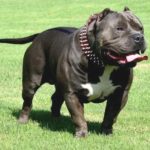


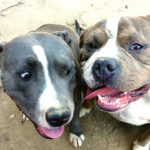




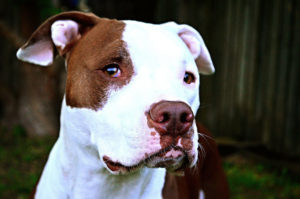
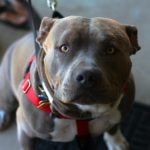




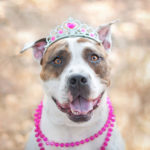
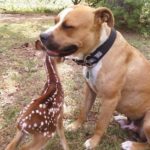

2 replies on “5 Reasons to Buy Your American Pit Bull Terrier from a Registered Breeder”
I had 2 previously – father (American Red Nose) & daughter (Staffordshire). They were the best ever. Unfortunately they passed. The last was a few years ago. Very hard cuz they’re family. We miss them dearly and didn’t want to go thru the loss again. A few months ago a friend was bringing a year and half old to humane society cuz moving and not able to bring dog with them so we took him. He’s very friendly and a loving dog. My problem is not having from a puppy I am struggling with few issues. He gets so excited when have company that he won’t listen and jumps on them-although getting better. The other issue is he grabs a pillow or blanket and sucks on it? Is this done normally because of moving to new surroundings? I’ve got beef shin bones to change mind frame but he doesn’t really bother too much it till later after company leaves. Any suggestions?
Hi Leslie, I adopted a red-nose from a girl who got him as a puppy but her sister was allergic to dogs and she had to re-home him. We got him at 9 months and he is currently 2 years old. He is very obedient but still gets over-excited when company comes. We put him in his crate (door open) until he calms down a bit, to curb the jumping, but when he is allowed out, he is still very excited and it will take a bit for him to settle down. Also, we will not enter the house until he is sitting a few feet back from the door (like if we are coming home & he is there without us). When I walk him, he must sit and we enter first and he must also sit before he goes out/comes in. This teaches him self-control as well as pecking order – very important. I think the bred itself tends to the jumping quality somewhat as every dog we looked at, before we fell in love with him, did the same thing. He totally jumps at the door like a mad dog if there is a stranger, but he didn’t start that until he was around 1 1/2 . He used to do the same thing with his pillow & blankets too and I would not give him a new one right away if he chewed his last one – natural consequences, but he has since grown out of that. He will occasionally still do it if we leave him with a sitter on vacation as opposed to boarding him. He is an awesome, super obedient dog, full of love and highly intelligent. I have considered talking to a behaviorist familiar with PBs to see if I can further curb the excitement when company comes, but I want to stress that he has gotten a lot better with work and consistency. I just wonder if they may know a quicker and easier way to get results. Good luck with your pup. You’re not alone, lol. 😉